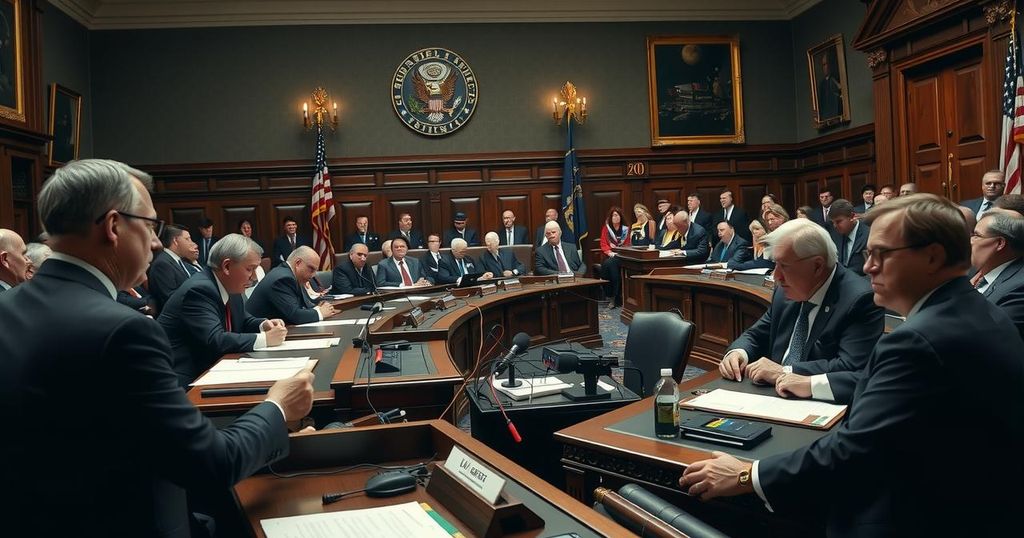U.S. lawmakers aim to block a $1.2 billion arms deal with the UAE, accusing it of aiding Sudan’s Rapid Support Forces. Senator Van Hollen and Representative Jacobs emphasize the need for the Biden administration to certify that the UAE is not supplying arms to the RSF. Despite evidence and accusations of the UAE’s involvement in the Sudan conflict, the arms deal’s political future remains uncertain in Congress due to the UAE’s alliance status.
Two Democratic lawmakers from the United States, Senator Chris Van Hollen and Representative Sara Jacobs, are seeking to prevent a $1.2 billion arms deal with the United Arab Emirates (UAE), citing the Gulf nation’s alleged provision of weapons to Sudan’s Rapid Support Forces (RSF). Their legislative resolutions, introduced in both the Senate and House of Representatives, contend that the Biden administration must certify that the UAE is not supporting the RSF prior to the completion of the arms sale.
Senator Van Hollen articulated concerns regarding the UAE’s role in exacerbating the humanitarian crisis in Sudan, emphasizing, “The UAE is an important partner, but the United States cannot sit idly by as it aids and abets the disaster in Sudan.” The UAE has faced accusations from the Sudanese Armed Forces, activists, and stakeholders for contributing to the turmoil in Sudan, a position backed by United Nations monitors, although the UAE has consistently denied these claims.
In April during a UN Security Council meeting, Sudan’s representative confronted the UAE over its purported involvement in the conflict, to which the UAE dismissed assertions as unfounded allegations. The UAE has acknowledged supplying arms to the RSF prior to the conflict escalating but has categorically rejected claims of continuing arms transfers post-April 15, 2023. Representative Jacobs, recently visiting Sudanese refugees, remarked, “The UAE is one of the biggest outside actors fuelling the violence in Sudan, and yet the U.S. is on the brink of selling the UAE another $1.2 billion in weapons that could end up in the hands of the RSF.”
Despite the serious concerns raised, analysts indicate that the resolutions are unlikely to surmount the political landscape in Congress, where the UAE is recognized as a crucial ally. Both resolutions would require bipartisan support and likely face a presidential veto, given recent diplomatic engagements between President Joe Biden, Vice President Kamala Harris, and UAE President Sheikh Mohammed bin Zayed, whereby the UAE was officially designated as a ‘major defense partner.’ The proposed arms package, endorsed by the Biden administration, includes missiles and rockets from American manufacturer Lockheed Martin.
Ultimately, Van Hollen and Jacobs aim to exert pressure on the UAE regarding its ties to the RSF while drawing necessary international attention to the escalating crisis in Sudan.
The controversy surrounding the proposed arms deal between the United States and the United Arab Emirates is rooted in the ongoing conflict in Sudan, particularly regarding allegations that the UAE has supplied arms to the paramilitary Rapid Support Forces (RSF). These accusations have led to significant scrutiny from various stakeholders, including U.S. lawmakers who are concerned about the implications of such support on the humanitarian situation in Sudan. The United States administration’s previous recognition of the UAE as a significant defense partner complicates the issue, as it balances diplomatic relations with humanitarian concerns.
In conclusion, the resolution introduced by Senators Van Hollen and Jacobs to halt the UAE arms deal underscores a critical and complex intersection of foreign policy, humanitarian issues, and allegations of international complicity in conflict. As they confront the potential implications of this substantial arms sale, the lawmakers strive to influence the UAE’s engagement in Sudan while navigating the challenging political landscape within Congress. Ultimately, their actions reflect a growing desire among some U.S. lawmakers to intertwine human rights concerns with diplomatic and military alliances.
Original Source: www.dabangasudan.org






